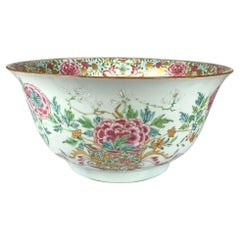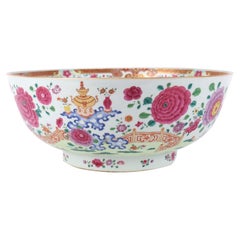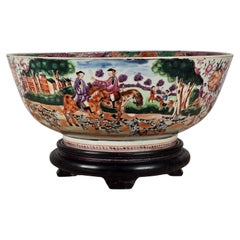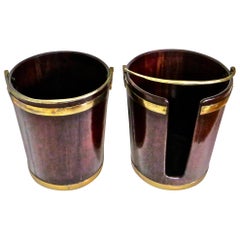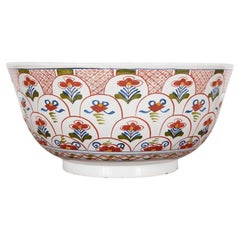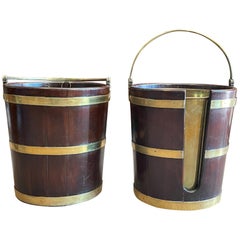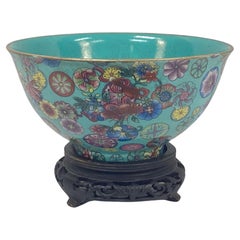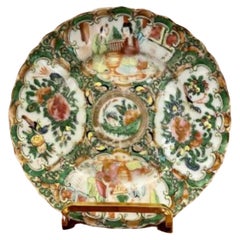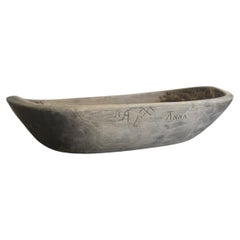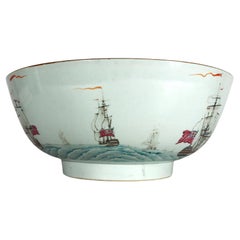1770s Decorative Bowls
to
9
380
1,171
7,679
2,460
981
3,973
1,605
160
62
239
296
163
710
1,000
611
254
100
3
1
7
4
3
2
1
7
2
6
5
4
3
3
Height
to
Width
to
9
9
9
1
Period: 1770s
Large Antique Chinese Export Porcelain Bowl Famille Rose Hand Painted C-1770
Located in Katonah, NY
This exquisite 18th-century Chinese export porcelain bowl was hand-painted during the Qianlong era, circa 1770, using colored enamels in the Famille Rose palette.
Pink peonies in ful...
Category
Chinese Chinese Export Antique 1770s Decorative Bowls
Materials
Porcelain
Chinese Export Porcelain Large Famille Rose Punch Bowl
Located in Downingtown, PA
Chinese Export Porcelain Large Famille Rose Punch Bowl,
Circa 1765-75
A large Chinese export porcelain punch bowl, distinguished by its vibrant famille rose enamel decoration. The e...
Category
Chinese Chinese Export Antique 1770s Decorative Bowls
Materials
Porcelain
A Famille Rose 'hunt scene' Punch Bowl Qianlong Period
Located in Kilmarnock, VA
A refined and richly detailed Chinese export porcelain punch bowl, Qianlong period (1735–1795), Qing Dynasty. Decorated in the famille-rose palette, the exterior features two large l...
Category
Chinese Chinese Export Antique 1770s Decorative Bowls
Materials
Porcelain
Pair of George III Brass-Bound Buckets; 1 Peat and 1 Plate, English
Located in Incline Village, NV
Pair of English Georgian brass-bound buckets, circa 1770. Buckets are well made, sturdy, and in excellent condition and completely original and intact. These handsome fine quality b...
Category
English George III Antique 1770s Decorative Bowls
Materials
Brass
18th c. English Delft Polychrome Punch Bowl
Located in Greenwich, CT
A deep delft punch bowl with polychrome decoration in reds, yellows and blues on a white ground with extensive exterior coverage depicting flowers in overlapping rounded tiles with a...
Category
English Antique 1770s Decorative Bowls
Materials
Delft
Pair of English Buckets Mahogany and Brass George III
Located in St.Petersburg, FL
A pair (not identical match but from the same maker) peat or plate buckets. Mahogany and brass, outstanding construction, heavy and well made, with beautiful brass details. Made in E...
Category
British George III Antique 1770s Decorative Bowls
Materials
Mahogany
Wedgwood Attributed Bat Printed Creamware Teabowl
By Wedgwood
Located in Bishop's Stortford, Hertfordshire
A very fine antique English creamware teabowl bat printed with scenes to two sides and attributed to Wedgwood and dating from around 1770. The teabowl is lightly potted standing raised on a narrow round foot rim with a simple raised round bowl shaped body. The teabowl is decorated to sides with black printed designs, one portraying a resting seated shepherd within a landscape with his dog and sheep...
Category
English Georgian Antique 1770s Decorative Bowls
Materials
Creamware
Italian Maiolica Ancient Sugar Bowl, Lodi, 1770-1780
Located in Milano, IT
Maiolica sugar bowl
Antonio Ferretti Manufacture
Lodi, Circa 1770-1780
Maiolica polychrome decorated “a piccolo fuoco” (third fire).
It measures 3.54 x 4.52 x 3.54 in (9 x 11,5 x 9 cm)
Weight: 0.394 lb (0.179 kg)
State of conservation: small and slight chips on the edges.
The small sugar bowl has a swollen and ribbed body resting on a flat base. The cap-shaped lid follows the rib of the container and is topped with a small knob in the shape of a two-colored fruit.
The sugar bowl is painted “a piccolo fuoco” (third fire) with the characteristic floral motif of bunches and isolated semis.
An example which closely corresponds to this one is kept at the Civic Museum in Lodi (G. Gregorietti, Maioliche di Lodi, Milano e Pavia, Catalogo della Mostra, Milano, 1964 n. 137).
This decorative style represented a strong point of the Lodi factory, which established itself thanks to the vivid nature of the colors made possible by the introduction of a new technique perfected by Paul Hannong in Strasbourg and later introduced by Antonio Ferretti to Italy. The production process, called “piccolo fuoco” (third fire), allowed the use of a greater number of colors than in the past; in particular, the purple of Cassius, a red made from gold chloride, was introduced. Its use allowed for many more tones and shades, from pink to purple.
The Ferretti family started their maiolica manufacturing business in Lodi in 1725.
The forefather Simpliciano started the business by purchasing an ancient furnace in 1725 and, indeed, we have evidence of the full activity of the furnaces starting from April of the same year (Novasconi-Ferrari-Corvi, 1964, p. 26 n. 4). Simpliciano started a production of excellence also thanks to the ownership of clay quarries in Stradella, not far from Pavia. The production was so successful that in 1726 a decree of the Turin Chamber came to prohibit the importation of foreign ceramics, especially from Lodi, to protect internal production (G. Lise, La ceramica a Lodi, Lodi 1981, p. 59).
In its initial stages, the manufacture produced maolicas painted with the “a gran fuoco” (double fire) technique, often in turquoise monochrome, with ornamentation derived from compositional modules in vogue in Rouen in France. This was also thanks to the collaboration of painters like Giorgio Giacinto Rossetti, who placed his name on the best specimens next to the initials of the factory.
In 1748 Simpliciano made his will (Gelmini, 1995, p. 30) appointing his son Giuseppe Antonio (known as Antonio) as universal heir. After 1750, when Simpliciano passed away, Antonio was directly involved in the maiolica factory, increasing its fortunes and achieving a reputation on a European level. Particularly important was the aforementioned introduction in 1760 of the innovative “a piccolo fuoco” (third fire) processing, which, expanding the ornamental repertoire with Saxon-inspired floral themes, was able to commercially compete with the German porcelains that had one of its most renowned offerings in the naturalistic Deutsche Blumen. Antonio Ferretti understood and promoted this technique and this decoration, proposing it in a fresher and more corrective version, less linked to botanical tables, both with or without contour lines, as well as in purple or green monochrome. After efforts to introduce more industrial production techniques to the sector succeeded, even the Ferretti manufacture, in the last decade of the eighteenth century, started heading towards decline despite its attempts to adapt production to neoclassical tastes.
In 1796 the Napoleonic battle for the conquest of the Lodi bridge over the Adda definitively compromised the furnaces. Production resumed, albeit in a rather stunted manner, until Antonio's death on 29 December 1810. (M. L. Gelmini, pp. 28-30, 38, 43 sgg., 130-136 (for Simpliciano); pp. 31 sgg., 45-47, 142-192 (for Antonio).
Bibliography
G. Gregorietti, Maioliche di Lodi Milano e Pavia Catalogo della Mostra, Milano, 1964 n. 137;
C. Baroni, Storia delle ceramiche nel Lodigiano, in Archivio storico per la città e i comuni del circondario e della diocesi di Lodi, XXXIV (1915), pp. 118, 124, 142; XXXV (1916), pp. 5-8;
C. Baroni, La maiolica antica di Lodi, in Archivio storico lombardo, LVIII (1931), pp. 453-455;
L. Ciboldi, La maiolica lodigiana, in Archivio storico lodigiano, LXXX (1953), pp. 25 sgg.;
S. Levy, Maioliche settecentesche lombarde e venete, Milano 1962, pp. 17 sgg.;
A. Novasconi - S. Ferrari - S. Corvi, La ceramica lodigiana, Lodi 1964, ad Indicem; Maioliche di Lodi, Milano e Pavia (catal.), Milano 1964, p. 17;
O. Ferrari - G. Scavizzi, Maioliche italiane del Seicento e del Settecento, Milano 1965, pp. 26 sgg.;
G. C. Sciolla, Lodi. Museo civico, Bologna 1977, pp. 69-85 passim; G. Lise, La ceramica a Lodi, Lodi 1981;
M. Vitali, in Storia dell'arte ceramica...
Category
Italian Rococo Antique 1770s Decorative Bowls
Materials
Maiolica
English Porcelain Blue and White Molded Bowl, Worcester, circa 1775
Located in New York, NY
With the Worcester crescent mark.
Category
English Antique 1770s Decorative Bowls
Materials
Porcelain
Related Items
Hand-Painted Porcelain Chinese Famille Rose Bowl With Stand
Located in Bradenton, FL
19th century hand-painted Chinese Famille Rose porcelain bowl with wooden stand. Vibrant colors of turquoise, red, yellow and blue. Floral and fish designs. Has gold trim at top of b...
Category
Chinese Qing Antique 1770s Decorative Bowls
Materials
Porcelain
Antique Chinese quality famille rose hand painted plate
Located in Ipswich, GB
Antique Chinese quality famille rose hand painted plate having wonderful hand painted decorated panels with flowers, figures, birds and leaves in wonderful green, red, white, yellow,...
Category
1770s Decorative Bowls
Materials
Ceramic
Antique 18th Century Dutch Delft Chinoserie Plate w. Peony & Chrysanthemum
By Delft
Located in Bad Säckingen, DE
This antique 18th Century Dutch Delft Chinoserie plate is a captivating piece of ceramic art that reflects the outstanding craftsmanship and cultural exchange of its time. Originatin...
Category
Dutch Baroque Antique 1770s Decorative Bowls
Materials
Faience
$938 Sale Price
20% Off
H 2.05 in Dm 12.8 in
Chinese Export Rose Medallion Canton Porcelain Punch Bowl w/ Multiple Cartooges
Located in New York, NY
A Chinese Export Rose Medallion Famille Rose canton porcelain punch bowl with multiple cartooge panels. The exterior of this gorgeous bowl ...
Category
Chinese Chinese Export Antique 1770s Decorative Bowls
Materials
Porcelain
$12,600
H 6.5 in Dm 16 in
18thC Chinese Porcelain Bowl Hand Painted Famille Rose, Qing Qianlong circa 1760
Located in Lincoln, Lincolnshire
This is a finely hand painted Chinese porcelain bowl from the 18th century, Qing dynasty, Qianlong period, 1736-1795.
The bowl is beautifully decorated with two panels of figure sce...
Category
Chinese Chinese Export Antique 1770s Decorative Bowls
Materials
Porcelain
$490
H 2.38 in Dm 4.75 in
Pair of George III Antique Steel Fire Irons
Located in Suffolk, GB
Pair of George III antique steel fire irons consisting of a pair of steel fire tongs and a shovel with a pieced centre.
Measures: 73.5 x 12...
Category
English George III Antique 1770s Decorative Bowls
Materials
Steel
Large Antique Qing Dynasty Famille Rose Elaborately Hand-Painted Bowl or Basin
Located in Hamilton, Ontario
This very large and substantial bowl or basin is signed by and unknown artist and originates from China, dating to approximately 1920 and done in the period Chinese Export style. The...
Category
Chinese Chinese Export 1770s Decorative Bowls
Materials
Pottery
$995
H 4.88 in Dm 16 in
Antique Rare Chinese Enameled Famille Rose Porcelain Bowl
Located in Brea, CA
Qing dynasty an unique antique important rare Chinese enameled Famille rose porcelain bowl with mark DaQingDaoGuangNianZhi , hand painted. ...
Category
Chinese Qing Antique 1770s Decorative Bowls
Materials
Porcelain
Large Late 19th Century Rose Medallion Chinese Export Bowl
Located in Los Angeles, CA
Large Rose Medallion Chinese Export bowl from the late 19th century.
Surrounded by classical oriental scenes around the outside and within the ce...
Category
Chinese Chinese Export Antique 1770s Decorative Bowls
Materials
Porcelain, Paint
Rattan Large Round Planter / Basket with Ring Handles and Brass Rim, Italy 1970
Located in Barcelona, ES
Beautiful Mid-Century Modern rattan pencil reed large planter or basket. Handcrafted in Italy, 1970s.
Round shaped rattan structure with brass rim and ring handles at both sides. Ins...
Category
Italian Mid-Century Modern 1770s Decorative Bowls
Materials
Brass
$1,944 Sale Price
20% Off
H 14.18 in W 15.75 in D 14.18 in
Antique Chinese Qianlong Period Famille Rose Bowl Qing Lowestoft, 18th Century
Located in Amsterdam, Noord Holland
A very nicely decorated bowl. Dating to around 1730/1740
10-10-19-2-1
Additional information:
Material: Porcelain & Pottery
Decoration Type / Colour: Polychrome
Region of Origin: ...
Category
Chinese Qing Antique 1770s Decorative Bowls
Materials
Porcelain
$448 Sale Price
24% Off
H 4.34 in Dm 10.4 in
Antique Amsterdam Bont Porcelain Bowl Chinese Polychrome Landscape, 17-18th Cen
Located in Amsterdam, Noord Holland
A very nicely made 18th century Kangxi Amsterdam Bont porcelain bowl.
We take a look at Amsterdams Bont porcelain from China. A relatively unknown niche of Chinese porcelain from ca 1680-1740 that was partly decorated in Europe. Because mainstream Chinese collectors have yet to discover the historical significance of these wares they are relatively easy to find in Holland. While also being highly interesting and of often super quality and with an amazing array of decorations. Amsterdams Bont is a name given to porcelain partly decorated in the Netherlands (most likely in cities like Delft, Haarlem, Makkum). Because Amsterdam was at this moment in time the trade centre of the western world and also of the porcelain trade a lot of this over enamelling was probably commissioned by Amsterdam merchants, to reap higher profits on otherwise boring Chinese wares. The name Amsterdam Bont probably derives from the fact that these type of decorated ware was sold by Amsterdam Merchants. Amsterdam Bont consists of either blanc or under glaze blue decorated Chinese porcelain of basic quality, that was later enhanced with red and sometimes other colours in the Netherlands. It must not be mistaken for other type of Chinese & Japanese blanc wares decorated in Europe. Those we simply call European Decorated Chinese porcelain...
Category
Chinese Antique 1770s Decorative Bowls
Materials
Porcelain
$446 Sale Price
20% Off
H 2.76 in Dm 5.91 in
Previously Available Items
Swedish Birch Bowl/Trough dated 1779
Located in Farsta, SE
Swedish Birch Bowl/Trough dated 1779
Owner marks and roman letters: MDCCLXXIX
Beautiful patina.
Made out of birch wood.
Height: 7 cm/2.7 inch
Dep...
Category
Swedish Scandinavian Modern Antique 1770s Decorative Bowls
Materials
Birch
Chinese Export Porcelain Large Punch Bowl Painted with Ships
Located in Downingtown, PA
Chinese Export Porcelain Large Punch bowl,
Painted with Marine Subject Images of A Royal Navy Fleet of Ships
A remarkable large "famille rose" Chi...
Category
Chinese Chinese Export Antique 1770s Decorative Bowls
Materials
Porcelain
Large Antique 18th century Chinese Porcelain Hunt Bowl Made circa 1770
Located in Katonah, NY
WHY WE LOVE IT: The Chinese hunt bowl at its finest!
Provenance: A similar hunt bowl can be found in the collection of the Seattle Asian Art Museum.
...
Category
Chinese Chinese Export Antique 1770s Decorative Bowls
Materials
Porcelain
Antique Chinese Porcelain Imari Bowl
Located in Katonah, NY
A Chinese porcelain bowl painted in Imari colors of cobalt blue, iron red and gold with an all-over pattern of peonies, rockwork, and other flowers. Inside the bowl the top border is...
Category
Chinese Qing Antique 1770s Decorative Bowls
Materials
Porcelain
18th Century North American Burl Bowl
Located in Greenwich, CT
Rare 18th century American burl bowl with lipped edge, the body with fine and profuse burl grain and in lovely untouched, dry surface.
Category
American Native American Antique 1770s Decorative Bowls
Materials
Burl
Pair First Period Worcester Soft Paste Porcelain Baskets England circa 1770
Located in Katonah, NY
We are pleased to offer this fine pair of First Period Worcester soft paste porcelain openwork baskets painted on the inside with English flowers in...
Category
English Rococo Antique 1770s Decorative Bowls
Materials
Porcelain
